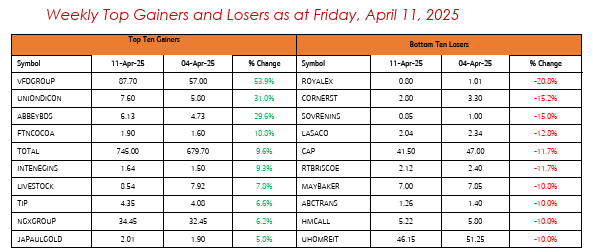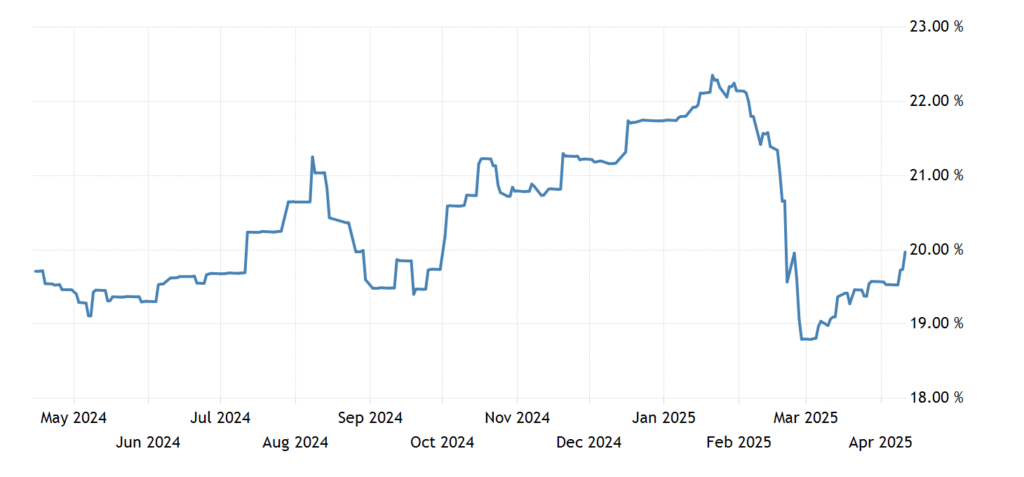This week’s global and Nigerian economic updates show a mix of recovery, tension, and new policies. From trade wars and inflation changes to Nigeria’s debt and crude oil challenges, here’s a breakdown of the economic events of the week and our forecasts for the near future.
The U.S.-China trade war just got worse. The U.S. raised tariffs on Chinese goods to 145%, combining a new 125% rate with the old 20%. At the same time, the U.S. offered lower tariffs (10%) to countries not retaliating—for 90 days only. In return, China hiked its tariffs to 125% and hinted it might hit back in other ways, like limiting U.S. movies and issuing travel warnings.
All this could mess up supply chains, especially in tech and farming, and push up prices. Even though U.S. inflation dipped to a five-month low of 2.40% in March 2025, that might not last.
Energy prices fell sharply, helping the drop, but food inflation ticked up, driven by pricier eggs, beef, and drinks. Core inflation cooled too—up just 2.80% year-on-year, the slowest since 2021.
In China, inflation dropped 0.10% YoY—its second straight month of deflation. Producer prices also fell by 2.50%, mainly due to weak local demand and trade tensions. China plans to roll out more stimulus, like extra subsidies for consumer goods, but that may not fully fix the problem.
In Kenya, the central bank cut its interest rate by 75 basis points to 10%, the fifth cut since August 2024, even though inflation is rising. The goal is to encourage lending and support the economy.
Nigerian Economy
Nigeria posted a rare Balance of Payments (BoP) surplus of $6.83 billion in 2024, compared to a $1.21 billion deficit in 2023. This improvement came from a jump in gas exports (+48.30%), non-oil exports (+24.60%), and rising remittances and capital inflows.
Nigeria’s external reserves also rose by $6 billion to $40.19 billion, thanks to reforms like FX liberalisation, fuel subsidy removal, and tighter monetary policy. These changes helped stabilize the economy, and things look positive going forward.
Another policy shift is the Naira-for-Crude initiative. It started as a pilot in October 2024 and now gets full support from the Federal Executive Council. The idea is simple—local refiners buy crude in naira instead of USD, which reduces pressure on forex and strengthens the naira. It’s not perfect yet, but it’s a big step toward energy independence.
But not everything’s rosy. Protests by Itsekiri youths over new electoral boundary changes forced a shutdown of the Escravos oil facility, which produces 28,000 barrels per day. This hurts Nigeria’s efforts to meet its daily production goal of 2.06 million barrels and worsens revenue challenges caused by lower crude prices.
Nigeria’s Debt Update
Nigeria’s public debt hit ₦144.67 trillion in 2024, up 48.6% from ₦97.34 trillion in 2023. The sharp rise came from a weak naira and non-stop borrowing to fund big projects and budget gaps.
External debt stood at ₦70.29 trillion ($45.78 billion), while domestic debt was ₦74.38 trillion ($48.44 billion). Most of the burden sits with the Federal Government, which holds over 89% of external loans.
Key creditors include World Bank, IMF, and AfDB, together holding nearly $22.32 billion. Eurobonds and commercial loans also form a big chunk.
Nigeria paid $4.66 billion in external debt servicing in 2024—mostly interest. On the local side, debt servicing hit ₦5.87 trillion, with ₦5.60 trillion just for interest. Bonds, Treasury Bills, Sukuk, and green bonds all played a role in Nigeria’s domestic debt structure.
CBN’s conversion of over ₦22 trillion in overdrafts to long-term debt also pushed borrowing limits higher, showing the growing pressure of managing public finance.
Stock Market Update
The Nigerian equities market concluded the week on a bearish trajectory, with the NGX All Share Index (ASI) declining by 0.90% week-on-week to settle at 104,563.34 points. This marks the index’s lowest level in four weeks, narrowing the year-to-date return to 1.59%.
The market capitalization mirrored this downturn, dipping by ₦440.51 billion or 0.67% to close at ₦65.71 trillion. Notably, this decline occurred despite the admission of 5.98 billion additional shares of First HoldCo Plc to the NGX Daily Official List.
Investor sentiment remained subdued throughout the week, as market participants adopted a cautious stance amid an earnings season that has thus far delivered few surprises.
The 90-day pause on US tariffs provided some global relief but failed to ignite a significant rally on Customs Street. Instead, profit-taking and portfolio rebalancing dominated trading activities, with investors rotating out of high-flying stocks and re-entering defensive counters.

The market’s breadth was decisively negative, with 27 gainers against 56 losers, translating to a breadth ratio of 0.48x. This underscores the extent of the weakness, as sell-offs permeated most sectors. However, trading activity experienced an uptick, suggesting that investors are still scanning for opportunities.
Weekly volume and value traded surged by 76.92% and 83.48%, respectively, to 2.09 billion units and ₦52.97 billion. The number of deals also increased by over 52%, pointing to heightened bargain hunting, particularly in low-priced, high-beta stocks.
Market Sectoral Performance
Sectoral performance was largely negative, reflecting a risk-off sentiment among investors. The NGX Insurance Index led the losses, down 4.57%, as counters like ROYALEX, CORNERST, and LASACO saw steep declines, erasing earlier gains from previous weeks. The Banking Index followed closely, losing 2.20% amid profit-booking in names like ACCESSCORP and ETI.
The NGX Consumer Goods and Oil & Gas indices shed 0.61% and 0.50%, respectively, pressured by declines in MAYBAKER, ETERNA, PZ, and OANDO. Even traditionally defensive sectors were not spared, with the Industrial and Commodity indices falling by 0.26% and 0.10%, respectively, dragged by losses in UPDC, CUTIX, and ARADEL.
Despite the generally bearish tone, there were bright spots in the market. Stocks like VFD Group (+53.9%), UNION DICON (+31%), ABBEYBDS (+29.6%), and FTN Cocoa (+18.8%) saw strong gains as investors chased speculative upside and played on momentum. On the flip side, ROYALEX (-20.8%), CORNERST (-15.2%), SOVRENINS (-15%), LASACO (-12.8%), and CAP (-11.7%) closed the week as the worst performers, underscoring the selective nature of the sell-off.
Fixed Income Market Update
At this week’s T-bills auction—the first for April and Q2—the CBN offered ₦800 billion (up from ₦700 billion previously) across 91-day, 182-day, and 364-day maturities. Demand weakened, with total subscriptions down 21.23% to ₦1.13 trillion.
Only ₦424.58 billion was allotted—the lowest since December 2024. Stop rates rose for shorter tenors: 91-day cleared at 18.50% and 182-day at 19.50%, while the 364-day held at 19.63%.

The secondary fixed income market remained bearish. Bond yields rose 16bps WoW to 18.87%, driven by sell pressure in short- and mid-term papers, particularly APR-29 (+93bps) and FEB-34 (+84bps). However, buying in the MAR-50 bond (-35bps) helped the long end dip slightly.
T-bills saw further sell-offs, pushing average yields up 119bps WoW to 21.05%, with the steepest increases in the 244-day (+278bps) and 237-day (+192bps) bills.
Eurobonds were hit hard as global risk-off sentiment triggered broad sell-offs. Yields jumped to 11.71%, from 7.72% the week before, led by SEP-28 (+557bps) and FEB-30 (+492bps).
Forecast & Conclusion
As we moved into April 2025, both global and Nigerian markets remained influenced by a mix of macroeconomic developments, earnings season trends, monetary policy expectations, and geopolitical tensions. While global sentiment showed signs of cautious optimism, Nigeria’s capital markets reflected subdued investor confidence amid mixed economic signals.
We expect the trade tensions between the U.S. and China to continue affecting global inflation and supply chains. For Nigeria, the outlook is cautiously optimistic. The BoP surplus, crude-for-naira policy, and reforms may strengthen the naira and bring some macro stability.
However, risks remain. Rising debt, oil disruptions like the Escravos shutdown, and naira depreciation could still weigh heavily in the months ahead.
While Nigeria made some progress—like a BoP surplus and helpful reforms—big challenges remain. Oil production troubles, ballooning debt, and FX risks still hang over the economy. It’s a week of mixed signals, with reasons for both caution and hope.
Like 👍, Comment, share this article, and Follow us on our social media handles.








